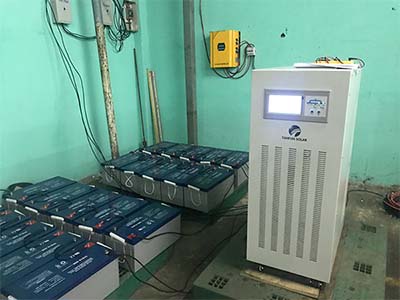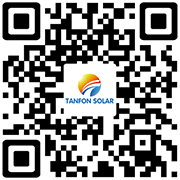 TANFON SOLAR
TANFON SOLAR
 November 16,2023
November 16,2023
Solar energy is a powerful and eco-friendly source of electricity, and solar panels play a crucial role in harnessing this energy. But have you ever wondered what happens to these panels when they reach the end of their life cycle? Enter the world of solar panel recycling, where innovation meets sustainability to close the loop in manufacturing.
I. Introduction
Definition of Solar Panel Recycling
Solar panel recycling is the process of collecting and reusing materials from old or malfunctioning solar panels to create new ones. It's a key component of sustainable manufacturing, ensuring that the environmental impact of solar energy remains as low as possible.
Importance of Sustainable Manufacturing
As our planet faces environmental challenges, the importance of sustainable manufacturing practices cannot be overstated. Solar panel recycling contributes significantly to reducing electronic waste and conserving valuable resources.
II. How Do Solar Panels Work?
To understand the importance of recycling, let's first grasp how solar panels work. Imagine them as superheroes that capture sunlight and convert it into electricity. For our younger readers, think of them as magical energy catchers!
Solar panels use special materials to absorb sunlight, creating a flow of electricity that powers our homes and gadgets. This magical process is called photovoltaic conversion, and it's the key to unlocking the potential of renewable energy.
The need for renewable energy sources is vital because they don't run out like traditional fossil fuels. They help combat climate change by reducing our reliance on non-renewable resources.
III. The Lifecycle of Solar Panels
Like any superhero, solar panels have a lifecycle that includes different phases:
Production Phase
This is the phase where the materials for solar panels are gathered and transformed into the powerful devices we see on rooftops. It's like creating the superhero suit and gadgets before sending our hero out into the world.
Installation and Usage
Once created, solar panels are installed on rooftops or in solar farms. They start capturing sunlight and converting it into electricity, contributing to a cleaner and greener planet.
End-of-Life Phase
Every hero has its time, and so do solar panels. After years of service, they reach the end of their lifecycle. This is where the challenge of electronic waste comes into play.
IV. The Challenge of Electronic Waste
Environmental Impact
Discarding old solar panels without proper recycling poses a threat to the environment. The materials used in these panels can harm ecosystems and contribute to pollution if not handled responsibly.
Growing Need for Recycling Solutions
As the use of solar panels grows, so does the need for effective recycling solutions. It's a challenge that requires innovative thinking and a commitment to sustainable practices.
V. Solar Panel Recycling Process
Collection and Transportation
The first step in recycling superhero solar panels involves collecting them from various locations. Think of it as gathering all the retired superheroes to give them a new purpose.
Disassembly and Sorting
Once collected, the panels undergo disassembly. Components are sorted, separating the valuable materials from those that can be safely disposed of. It's like breaking down the superhero suit into individual pieces for inspection.
Material Recovery
In this step, the separated materials are recovered for reuse in new solar panels. It's the superhero equivalent of crafting a new suit from the recycled pieces, ensuring that the legacy continues.
VI. Benefits of Solar Panel Recycling
Environmental Conservation
Recycling solar panels reduces the environmental impact associated with electronic waste. It prevents harmful materials from ending up in landfills, protecting our planet.
Resource Conservation
The process conserves valuable resources like metals and glass, reducing the need for mining and extraction. It's a sustainable way to ensure that we make the most of our finite resources.
Energy Savings
By reusing materials, solar panel recycling consumes less energy than creating new panels from scratch. It's an energy-efficient approach to sustainable manufacturing.
VII. Challenges in the Recycling Process
Technological Barriers
Recycling superhero solar panels comes with its set of challenges, including technological barriers. Researchers and engineers are continually working to overcome these obstacles for more efficient recycling.
Cost Challenges
While the benefits are immense, the cost of recycling can be a hurdle. Striking a balance between environmental responsibility and economic feasibility is crucial.
Awareness and Education
Many are still unaware of the importance of recycling solar panels. Educating communities and industries is essential to promote responsible disposal and recycling practices.
VIII. Innovations in Solar Panel Recycling
Emerging Technologies
In the ever-evolving world of recycling, new technologies are constantly emerging. These innovations aim to make the recycling process more efficient and cost-effective.
Research and Development Efforts
Scientists and engineers are conducting extensive research to improve recycling methods and discover new ways to repurpose materials from solar panels.
IX. The Role of Governments and Industry
Regulatory Frameworks
Governments worldwide play a vital role in promoting recycling through regulatory frameworks. These regulations set standards for responsible disposal and recycling practices.
Corporate Responsibility
Industries involved in solar panel manufacturing must take responsibility for their products throughout their lifecycle. This includes investing in recycling infrastructure and promoting awareness.
X. Teaching Kids About Solar Panel Recycling
Educational Initiatives
Schools and organizations are implementing educational initiatives to teach kids about the importance of recycling. Hands-on activities and engaging lessons help instill a sense of responsibility from an early age.
Hands-On Activities for Awareness
Imagine a classroom where kids get to disassemble a model solar panel and learn about recycling firsthand. Hands-on activities make the concept tangible and memorable.
XI. Future Outlook
Advancements in Recycling Technologies
The future looks promising with ongoing advancements in recycling technologies. Expect more efficient and sustainable methods for handling electronic waste.
Global Trends in Sustainable Manufacturing
As the world embraces sustainability, global trends in manufacturing are shifting towards eco-friendly practices. Solar panel recycling is set to play a pivotal role in this transformation.
XII.Conclusion
In conclusion, solar panel recycling is not just about disposing of old panels—it's about giving them a new life. By recycling, we contribute to a cleaner environment, conserve valuable resources, and pave the way for a sustainable future.
FAQs (Frequently Asked Questions)
-
Can all solar panels be recycled?
Yes, most solar panels can be recycled, but advancements are ongoing to improve the recycling process for all types.
-
How can I dispose of old solar panels responsibly?
Check with local recycling facilities or contact the manufacturer for guidance on proper disposal and recycling options.
-
Are there any incentives for recycling solar panels?
Some regions offer incentives or programs to encourage solar panel recycling. Check with local authorities for information.
-
Can recycled materials from solar panels be used for other purposes?
Yes, recycled materials can be repurposed for various applications, contributing to a circular economy.
-
What happens if solar panels are not recycled?
If not recycled, solar panels contribute to electronic waste, posing environmental risks. Recycling helps mitigate these impacts.












